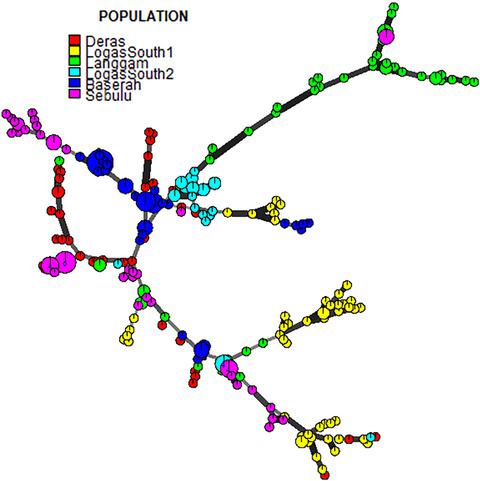当前位置:
X-MOL 学术
›
Plant Pathol.
›
论文详情
Our official English website, www.x-mol.net, welcomes your feedback! (Note: you will need to create a separate account there.)
Acacia plantations in Indonesia facilitate clonal spread of the root pathogen Ganoderma philippii
Plant Pathology ( IF 2.7 ) Pub Date : 2020-05-01 , DOI: 10.1111/ppa.13153 David E. Page 1 , Morag Glen 1 , Desy Puspitasari 2 , Istiana Prihatini 2 , Abdul Gafur 3 , Caroline L. Mohammed 1
Plant Pathology ( IF 2.7 ) Pub Date : 2020-05-01 , DOI: 10.1111/ppa.13153 David E. Page 1 , Morag Glen 1 , Desy Puspitasari 2 , Istiana Prihatini 2 , Abdul Gafur 3 , Caroline L. Mohammed 1
Affiliation

|
Ganoderma philippii is a root pathogen of many woody plants in tropical regions and is particularly aggressive to Acacia mangium, which is grown on a 6‐year rotation for pulpwood in Indonesia. The disease becomes progressively worse over each rotation and control measures have met with limited success. We studied the population genetics of G. philippii to evaluate the role of sexual and asexual reproduction in its mode of spread. Populations were genetically distinct with high levels of inbreeding, and clonal spread to adjacent trees increased after the first rotation. Despite the high levels of genetic diversity seen at all sampling scales, migration rates appear low. Measures to reduce the underground spread of the pathogen as well as methods to prevent the initiation of new infections from basidiospores will be needed to reduce the incidence of root rot in A. mangium plantations.
中文翻译:

印度尼西亚的金合欢种植园促进了根病原体灵芝的克隆传播
Ganoderma philippii 是热带地区许多木本植物的根病原体,对印度尼西亚的纸浆木材轮作 6 年种植的 Acacia mangium 尤其具有攻击性。疾病在每次轮换中逐渐恶化,控制措施收效甚微。我们研究了 G. philippii 的种群遗传学,以评估有性和无性繁殖在其传播方式中的作用。种群在遗传上不同,近亲繁殖水平高,第一次轮换后向相邻树木的克隆传播增加。尽管在所有抽样尺度上都看到了高水平的遗传多样性,但迁移率似乎很低。
更新日期:2020-05-01
中文翻译:

印度尼西亚的金合欢种植园促进了根病原体灵芝的克隆传播
Ganoderma philippii 是热带地区许多木本植物的根病原体,对印度尼西亚的纸浆木材轮作 6 年种植的 Acacia mangium 尤其具有攻击性。疾病在每次轮换中逐渐恶化,控制措施收效甚微。我们研究了 G. philippii 的种群遗传学,以评估有性和无性繁殖在其传播方式中的作用。种群在遗传上不同,近亲繁殖水平高,第一次轮换后向相邻树木的克隆传播增加。尽管在所有抽样尺度上都看到了高水平的遗传多样性,但迁移率似乎很低。



























 京公网安备 11010802027423号
京公网安备 11010802027423号